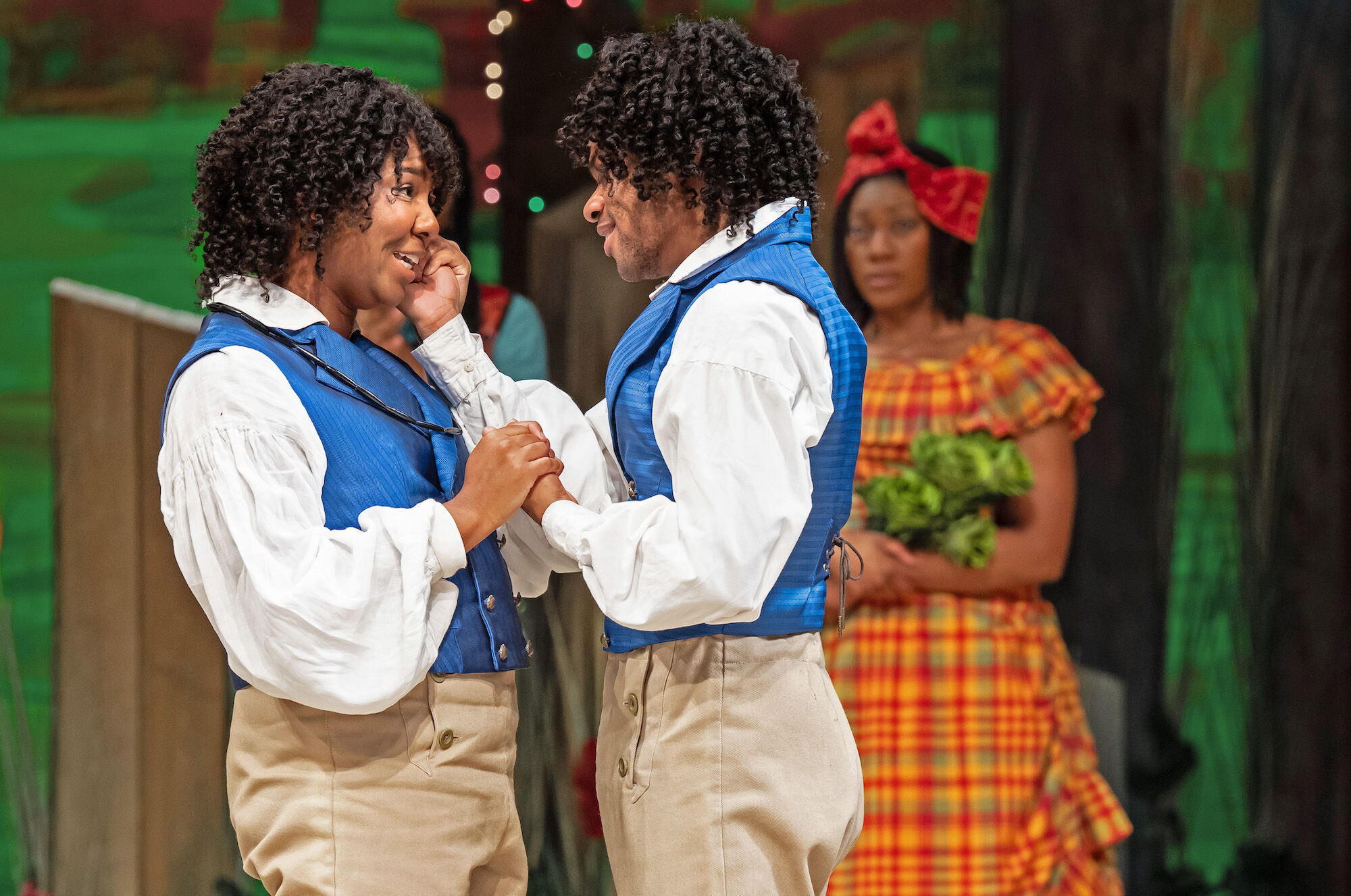In an environment where book bans and drag bans continue to escalate, a new production of Shakespeare’s Twelfth Night is igniting conversations about creative expression and queer identity.
As far back as the early 2010s, Shakespeare’s cross-dressing comedy has been challenged by school districts for “alternative lifestyle instruction” and “homosexual content”— the latter because a female character, disguised in male drag, falls in love with a man. Though Twelfth Night also explores themes of grief, loneliness, and revenge, its gender-centric plot and LGBTQ+ undertones have stirred controversy.
Director Tyrone Phillips, a first-generation Jamaican American, offers a fresh take, placing the island of Illyria in the Caribbean in Chicago Shakespeare Theater’s production, which runs through November 26. Amid this backdrop, which has its own real-life anti-LGBTQ+ challenges, Phillips swaps trauma for triumph.
Sydney Lynne’s scenic design is bright and verdant, providing a sun-soaked playground for an exuberant and diverse cast. Live music ranges from Bob Marley and the Wailers’ “No Woman, No Cry” to Otis Redding’s “Try a Little Tenderness” (the latter performed by Ronald L. Conner’s delightfully drunk Sir Toby Belch, Israel Erron Ford’s wise jester Feste, and Alex Goodrich’s dorky Sir Andrew Aguecheek).
Though the play’s protagonist Viola (Jaeda LaVonne) is ostensibly heterosexual and cisgender—she appears in a dress in the first moments of the play and falls in love with a man—by the end, the audience may wonder, is she really? Thanks to Phillips’s gender-expansive approach that retains the play’s strong sense of comedy, Twelfth Night delivers a bastion of inclusivity and joy.

Gender exploration and queer longing abound in this Twelfth Night. Viola poses as a man named Cesario, first for safety after surviving a shipwreck and landing in an unfamiliar place, then as an excuse to be close to her crush, Illyria’s strapping Duke Orsino (Yao Dogbe). However, by the show’s end, she remains proudly in her trousers and vest rather than returning to her femme look from the first scene. Viola’s twin brother Sebastian (Justen Ross), initially thought to have perished in the shipwreck, is rescued and nursed back to health by handsome pirate Antonio (Adam Poss), whose amorous feelings for the former are front and center. And when Countess Olivia (Christiana Clark), who marries Sebastian thinking he is Viola, is informed that she could have ended up married to a woman, she simply smiles and shrugs, much to the audience’s delight.
“I feel like Shakespeare was ahead of his time when he explored gender and gender roles in this play,” Phillips states in Twelfth Night’s program. “I’m always about breaking those rules imposed on us by society, about looking at each other as humans first. It’s liberating for Viola to be able to try on a different gender and challenge our perceived notions.”

Could this unapologetic Twelfth Night be banned in states like Texas, Arizona, and Florida, where anti-drag laws for those under 18 may apply to Shakespeare? Sadly, the answer is a solid maybe. Though gender misunderstandings abound, no character in this production apologizes for who they are or who they love, whether that’s a firmly established identity or an in-progress discovery. But the news isn’t all bad. Currently, six states require LGBTQ+ inclusion in state curricular standards (including Illinois), which means that Chicago Shakespeare Theater’s student performances can present such inclusive interpretations.
In Phillips’ Twelfth Night, Viola doesn’t return Olivia’s advances, not necessarily because Viola isn’t into women, but because she loves Orsino more. Similarly, Sebastian isn’t turned off by Antonio’s clear crush on him—in fact, the pair’s loving gestures to one another suggest the feelings are mutual. Though they don’t end up together, this interpretation suggests that Sebastian takes the opportunity to marry a wealthy duchess over an uncertain life with a wanted pirate who’s been taken prisoner—and who wouldn’t, especially if they’ve barely survived a shipwreck three months previous? Rather than pandering to queer and trans panic, Phillips trusts his audience to explore Twelfth Night’s characters and their motivations while at the same time enjoying their songs, shenanigans, and their sweetness.
“People can seek love as whoever they authentically are,” Phillips said of his production’s message. “I know our audience is ready for that conversation.”
Twelfth Night runs through November 26 at Chicago Shakespeare Theater.
RelatedIndya Moore discusses her stage debut in the Breaking the Binary Theatre Festival and namedrops some favorite queer artists deserving more visibility.













